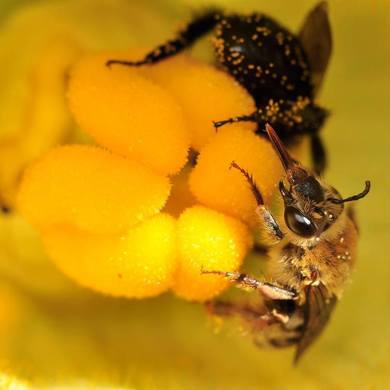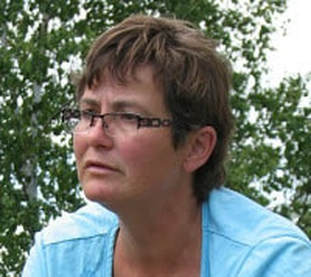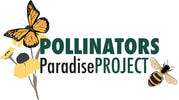 Squash Bee Squash Bee This was posted on our blog in September, 2015. Susan Chan is coming back to town for Disappearing Act: part 2! Pollination biologist and practicing agriculturalist, I caught up with Susan, before her talk on Oct 27th. What comes first for Susan, pollinators or growing food locally? “The two are intrinsically intertwined,” she replies. Susan is interested in food for humans, but also food for everyone else—that is, for all creatures and plant reproduction, since plants are the first layer of our food chain. A self-proclaimed “whole system thinker,” Susan believes that the healthier the whole system is, the more resilient we are as communities. “The way to be more resilient is to have a whole bunch of players in the field,” she says. About twenty-five years ago, Susan became interested in the honeybee while studying with Peter Kevan (University of Guelph). She describes Peter as being “ahead of his time.” He pointed out that we couldn’t have food production predicated on one pollinator—the honeybee, which is not even native to this country. He pushed the Ministry of Agriculture to do more for native bees. This opened up a whole new interest for Susan: solitary bees and pollinators. One particular bee caught Susan’s attention—the squash bee (now her area of expertise). The squash (and pumpkin) bee is a specialist bee at particular risk from neonicotinoids. "Why the draw," I ask Susan? “I fell in love with it. It’s a very gentle, beautiful bee, with a very interesting life. I feel like I didn’t have any choice; this is what I had to do. It chose me.” “Bees are a poster child but they are representing a bigger size of the pie, this is an insecticide that kills all insects,” Susan points out. I ask whether she is working with the Aboriginal/First Nations community in any capacity. Susan tells me that in fact, the squash bee is a “First Nations’ bee,” belonging to Indigenous culture, and originating in Central America thousands of years ago. It followed their activities and cultivation to Canada: “It’s an immigrant, like the rest of us.” "Susan reports that she had the opportunity to speak to a group of First Nations people (Association of Iroquois and Allied Indians, AIAI) in partnership with Farms at Work for the Kanienkeha:ka (Mohawk) Flint Corn Seed-Saving & Education Project and is keen for their support in seeing the squash bee established at permanent nesting sites. “It could be a First Nations’ symbol,” Susan muses." Pollinator habitat and farmland in Ontario Susan Chan Susan Chan Susan explains that we absolutely need to preserve farmland because by its nature, a farm preserves natural spaces. Habitat is a simple thing to take care of and farmers are already creating habitat on farms. Farmers own most of the land in Ontario so instead of seeing it as wasted space, they can preserve it as an asset. I ask about the Greenbelt and what we can creatively do to help support farmers. She tells me that Quebec created protection for farmlands in the 70s! The effect is that people can afford to buy farmland. By contrast, in Ontario, farmers see their land as a retirement fund (no CPP for farmers). Come on Ontario! The solution to many of our environmental woes is local food, according to Susan. “We need to make it a priority, that is, have a food policy to affect land policy. Stop buying food from elsewhere and thinking about our food as a commodity.” Find the open door to change things. Susan says she looks for opportunities in what can seem impossible situations. For example, there are stipulations that developers have to leave natural lands around their developments. Imagine that similar stipulations to create farms in developments be applied as well, so more people can get involved in food production. “I like to find the open door to change things,” Susan ends.
2 Comments
10/19/2020 10:23:22 pm
This is a really interesting blog, and I think that you are all amazing to be able to write this. I am an aspiring biologist, and I believe that it is absolutely important that I try my best to make things happen for myself. The more that I try to do that, the better my life will be, that is what I believe in. It matters to me that I get to the end of the is. You are all amazing for this
Reply
Leave a Reply. |
Archives
September 2018
Categories |
|
|
Butterflyway Hamilton: www.facebook.com/butterflywayhamilton/
Environment Hamilton: https://www.environmenthamilton.org/ Hamilton Naturalists' Club: https://hamiltonnature.org/ |

 RSS Feed
RSS Feed